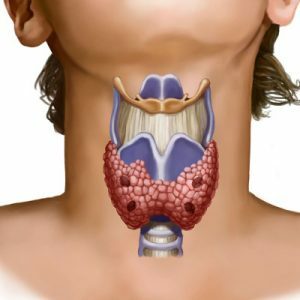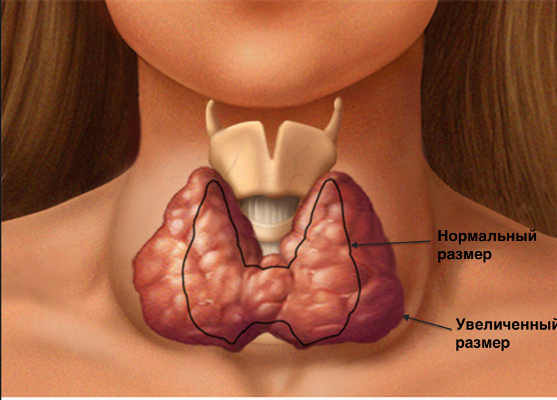Thyroid enlargement - causes, symptoms, diagnosis
 Doctors consider the enlargement of the thyroid gland to be a rather insidious syndrome - this is due to the fact that pathology at early stages develops completely asymptomatically and the patient comes to consult a doctor when all the signs of the condition in question are already expressed.But this does not mean that, in the absence of symptoms, nothing serious happens in the body - just in the initial stage, an increase in the thyroid gland "beats" the work of all organs and systems.
Doctors consider the enlargement of the thyroid gland to be a rather insidious syndrome - this is due to the fact that pathology at early stages develops completely asymptomatically and the patient comes to consult a doctor when all the signs of the condition in question are already expressed.But this does not mean that, in the absence of symptoms, nothing serious happens in the body - just in the initial stage, an increase in the thyroid gland "beats" the work of all organs and systems.
Reasons for thyroid enlargement
We recommend:Many factors can become the causes of the pathology in question:
- In harmful production;
- forced inhalation of toxic substances;
- accommodation in areas with poor ecology;
- chronic diseases;
- regular eating disorders.
But the main cause that provokes an increase in the thyroid gland is recognized as hormonal disorders.Moreover, pathology is more often diagnosed in women, because they undergo colossal hormonal changes during pregnancy, during menopause or menopause.An important role in determining the cause of the pathology under consideration is played by stresses, the psychoemotional state of the patient and the degree of strength of the immune system.
Classification of pathology
Physicians classify thyroid enlargement as follows:
- First stage.No visible changes are found, the body works without any violations, complaints from the patient do not come.
- The second stage.Determine the size of the thyroid gland can only be done with palpation( palpation), visually any changes in the size of this organ are not visible and no complaints from the patient come.
- Third stage.The increase is noticeable not even to professionals, the turn of the head brightly distinguishes pathology, there is a deformation of the neck.
For the second stage, the density and "woodiness" of the organ will be characteristic - normally the thyroid gland should be elastic, soft.When examining the patient from the third stage of pathology, the specialist will note the stiffness of the gland, although it must move freely to the side.
Thyroid gland enlargement and degree of pathology
In medicine, there are several degrees of thyroid enlargement - this classification allows not only to accurately determine the prevalence of the disease, but also to choose an effective treatment.
First degree
This refers to the very beginning of the disease - no visible signs and no tangible symptoms.Please note: if the patient has undergone a preventive examination and with the help of an instrumental examination the doctors detected an increase in the thyroid gland of the first degree, the treatment will be very short and very effective.
Second degree
When examining the patient, the second degree of pathology will be manifested by an increase in the neck, the doctor will be able to feel the thyroid gland and even identify the presence of nodes.When swallowing saliva and any liquid / products, the thyroid glands are clearly visible, and the patient receives complaints of minor pain in the throat.

Note: if at this stage of the disease the doctor reveals small nodules in the thyroid gland( from 1 to 3 cm), then a decision is made to monitor and prescribe drug therapy dynamically.
Third degree
The most striking symptoms, the increase( "swelling") of the neck is visually clearly visible, the head rotates the body and the surrounding parts are visible.Pay attention: even in this degree of pathology development the patient can not make any complaints about deterioration of state of health.
Symptoms of augmentation of the thyroid gland
The greatest danger of this pathology is the asymptomatic course.Meanwhile, an increase in the thyroid gland leads to disruption in the work of the entire body, powerfully affects the reproductive functions of both men and women. Doctors identify the main symptoms that will indicate a violation in the work of this body :
-
 a sharp increase in weight for no apparent reason;
a sharp increase in weight for no apparent reason; - chronic fatigue syndrome;
- irritability and nervousness without signs of depression and nervous breakdown;
- is a painful periodical and aching character in the anterior part of the neck;
- the skin becomes dry, in some places its puffiness is noted;
- heart palpitations and arrhythmia;
- insomnia at night and increased daytime drowsiness;
- increased sweating.
In the development of pathology, the thyroid gland begins to exert pressure on the blood vessels, reducing the flow of oxygen into the brain - the patient notes slight dizziness, headaches in the frontal part.Very often with an increase in the thyroid gland there is a dry cough - this organ presses on the trachea, irritates the nerve endings.If a cough is present, then in a short time you can expect the appearance of wheezing in the voice.
More on the symptoms of an increase in the thyroid gland - in a video review:



